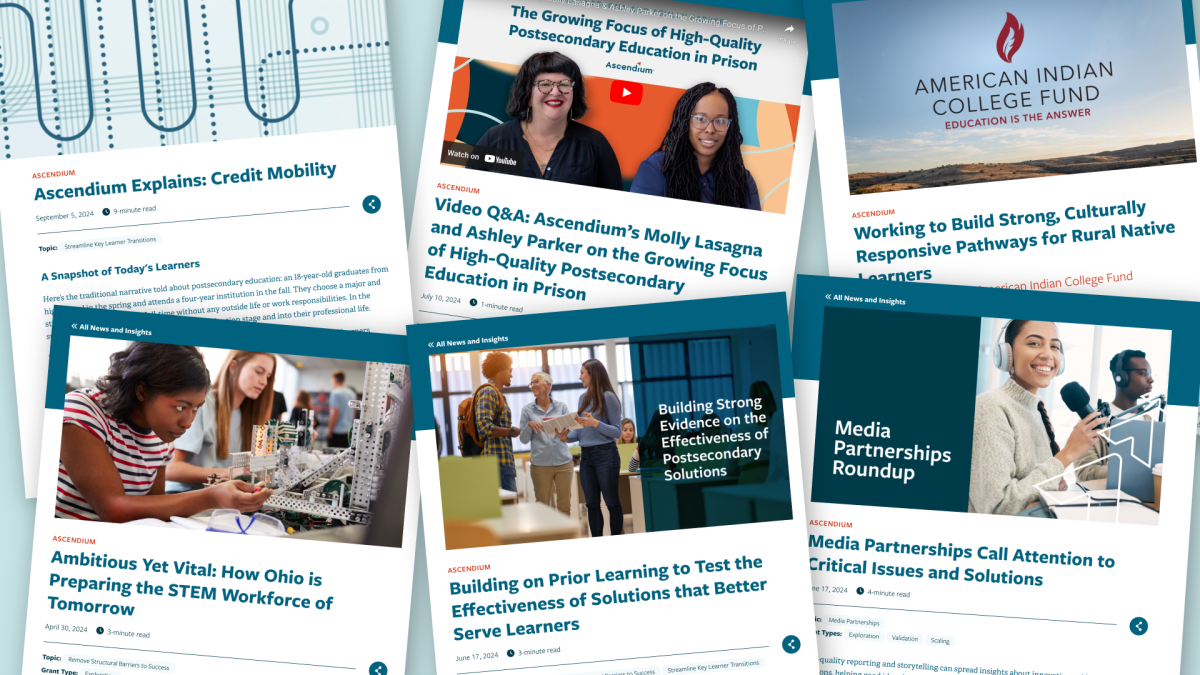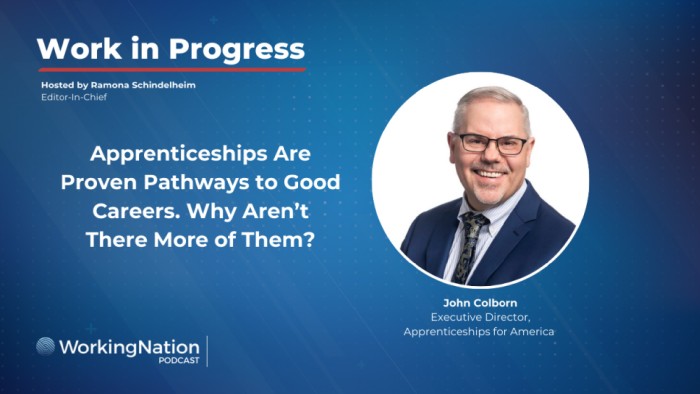
2024 in Review: Ascendium’s Top Stories and Insights Driving Change
At Ascendium, we see our role as not only a funder but also a catalyst for sharing insights and disseminating practical actions that education leaders can take. This year, our partners tackled key topics like credit mobility, evidence-based sectoral training programs, and expanded pathways for rural learners — solutions that organizations and systems across the country can implement now to benefit diverse learners. States also took bold steps on initiatives we support, including expanding postsecondary education in prison and revitalizing pathways into the STEM workforce.
As 2024 draws to a close, we've curated a selection of articles and resources highlighting partners and initiatives from across our grantmaking focus areas. While not exhaustive, this collection is designed to inspire actionable ideas and offer valuable strategies to help your institution or organization make an immediate impact in advancing the field.
Remove Structural Barriers to Success
The Ohio Strong Start in Science initiative aims to remove barriers in entry-level science courses that prevent many learners, especially those from underrepresented backgrounds, from succeeding in STEM programs. This article explores efforts to redesign courses and support systems to close equity gaps and prepare more students for in-demand STEM careers.
- “Community College Bachelor’s Degrees in Florida: An Update on Enrollment and Labor Market Outcomes”
This brief analyzes trends in Florida’s community college baccalaureate programs, offering insights into enrollment, graduation rates, and labor market outcomes. It also provides a roadmap for other states considering similar initiatives.
This resource from the National Association of College and University Business Officers equips postsecondary education finance professionals with tools to implement student-centered financial strategies, empowering institutions to optimize resources and support equitable outcomes for learners from low-income backgrounds. Learn how institutions are using it.
Streamline Key Learner Transitions
Ascendium’s Jessa Valentine examines how sectoral training programs can enhance economic mobility by aligning education with high-demand careers. The article also highlights Ascendium’s role in expanding successful models and advancing research on their effectiveness.
This explainer tackles the disconnect between today’s diverse learners and the rigid systems of credit transfer in postsecondary education. The piece underscores the need for improved credit mobility policy and practice to prevent credit loss and help learners complete their desired credentials more efficiently.
This article highlights Ascendium’s support for innovative financing models to expand rural talent pipelines and connect learners from low-income backgrounds with well-paying jobs. Exploring new and renewable funding mechanisms for sectoral and other workforce training programs is key to the expansion of high-quality models.
This toolkit from The Council of State Governments helps states create and sustain apprenticeship programs to address workforce shortages and make civil service more accessible, especially as public sector jobs increasingly drop degree requirements.
Expand Postsecondary Education in Prison
This article examines how state-level partnerships are helping expand postsecondary education opportunities for incarcerated learners by breaking down financial and structural barriers, creating lasting benefits for both learners and communities.
In this video Q&A, Ascendium’s Molly Lasagna and Ashley Parker discuss the challenges and opportunities in prison education, emphasizing the need for comprehensive support systems to help incarcerated learners fully benefit from educational opportunities.
This article highlights the Rockwood Leadership Institute’s 2024 Fellowship for Leaders in Higher Education in Prison, which equips formerly incarcerated individuals with the skills and networks to lead change in the field of prison education.
This RAND Corporation report evaluates the impact of COVID-19 measures in state prisons, focusing on how the crisis disrupted educational opportunities for incarcerated learners. It highlights both immediate setbacks and long-term challenges that worsened existing disparities and hindered progress toward upward mobility.
Support Rural Postsecondary Education and Workforce Training
This profile of the American Indian College Fund highlights how the organization supports Native learners at tribal colleges by enhancing career advising and creating pathways to employment after completing their degree.
This profile spotlights the Wakiya Foundation’s initiative to partner with tribal colleges and Western Governors University to launch bachelor’s programs aligned with regional workforce needs.
This article explores Workforce Matters, a network of grantmakers that supports workforce development for Native American and Alaska Native communities. With Ascendium’s backing, their new initiative advocates for policies and practices that center Native values in workforce development.
Learning and Impact
This article showcases two validation grants that measure the impact of postsecondary education and workforce reforms. One study assesses a tech-enabled learning app in Louisiana’s community colleges, while the other evaluates Virginia’s noncredit workforce training initiative.
Media Partnerships
This article highlights the role of media in advancing innovative solutions for education and workforce development. Through powerful storytelling, these media partners help drive awareness of the need for systemic change and call attention to the solutions that support learners in communities across the country.
View all News and Insights here.


